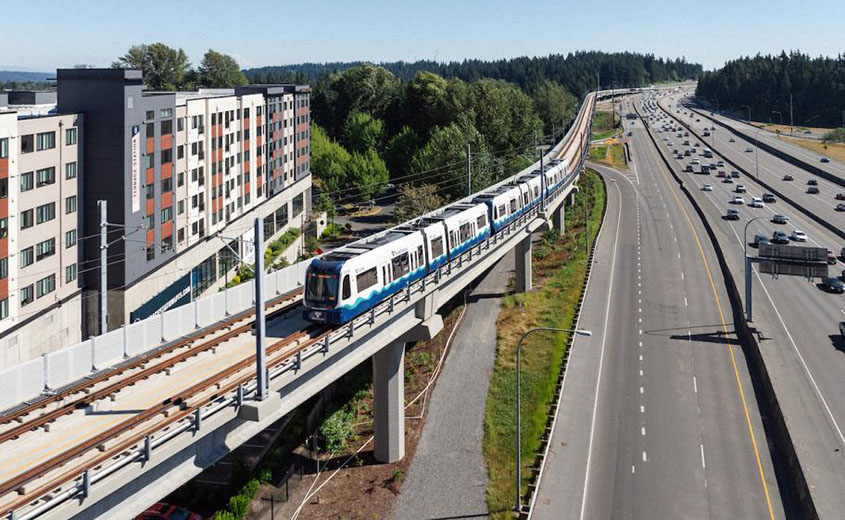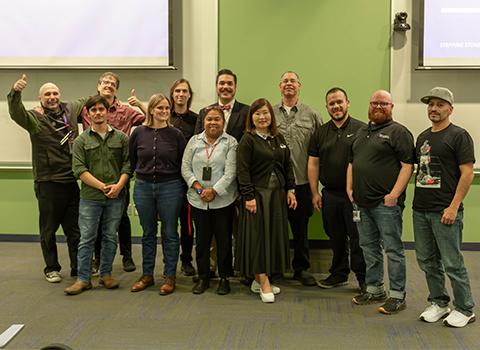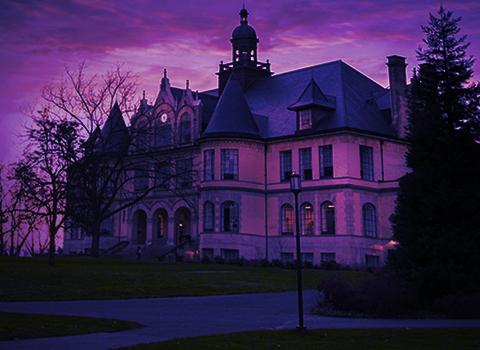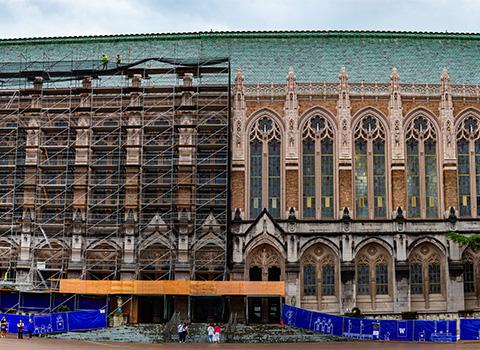Light rail expansion increases power of U-PASS

A Sound Transit train on the new Link extension to Lynnwood. Sound Transit
When new Sound Transit light rail stations open this month, it will be a win for mobility around the region. It will also mean an upgrade to the U-PASS, said Bill Bryant, assistant director of UW Transportation Services.
Starting Aug. 30, the Link light rail will go north to Lynnwood, Mountlake Terrace and Shoreline. The UW community will be able to easily explore more of the region thanks to the unlimited rides the U-PASS provides.
“U-PASS holders are very likely to find themselves benefiting from that line, whether it's for work, school, play or errands,” Bryant said. “It's really another feather in the cap of the U-PASS program. It adds value to the pass."
Shifting how we get around the region
Link light rail expansion comes at a time when the UW is seeing record numbers for sustainability around transportation and commuting. The most recent commuting survey showed that only 16.3% of students, staff and faculty were driving to campus alone.
The majority of transit riders among UW students, staff, and faculty takes the bus rather than light rail — but that majority is shrinking, said Bryant.
“It's not necessarily that bus riders are moving to light rail, but it's that we seem to be adding customers as light rail expands,” he said. “I think that the Lynnwood extension is really going to be a case study in how many new riders we have versus how many riders change their existing habits.”
Changes to King County Metro and Community Transit bus routes will follow, as the Link expansion reshuffles the area’s transit infrastructure. Starting Sept. 14, more buses will travel to the new stations, and some commuter routes will be changed or eliminated.
King County Metro will also launch the new RapidRide G Line, providing bus service as frequently as every six minutes between downtown Seattle, First Hill, Capitol Hill, the Central District and Madison Valley. The line will be another key connection to the Sound Transit system.
The first UW Football game of the season takes place the day after the new stations open. Bryant anticipates that the trains will be full of football fans and people excited to try out the expanded line.
“It's going to be busy and then there will be some teething pains,” he said. “That's going to be a real test, and I would encourage people to be patient.”
U-PASS: A ‘national leader’
Implemented in 1991, the U-PASS gives holders unlimited rides on regional buses, commuter trains, light rail and water taxis. Nearly all students over the age of 18 pay for it through a mandatory fee, while faculty and staff have received a fully subsidized pass as an employee benefit since 2022. Also since 2022, transit across much of the state is free for anyone 18 and younger.
Results of the commuting survey for 2023 showed that 96% of UW students, staff and faculty had a valid U-PASS and that 86% were using it on Link light rail regularly or occasionally.
“The U-PASS has always been a national leader in encouraging transit ridership,” Bryant said. “It has helped the recovery of UW-related ridership outpace the recovery of other transit ridership [since the pandemic] throughout the Puget Sound area.”
No need to ‘tap off’ anymore
On Aug. 30, along with the extension to Lynnwood, Sound Transit will institute another change — a flat fare for all rides regardless of distance. This means using U-PASS will get easier. Instead of tapping passes when they get on and off trains, riders will only need to tap them before boarding.
When the UW community rides Link light rail, they can do it knowing that they are doing what’s best for the environment.
The trains, like Metro’s electric trolley buses that we see in the U District every day, run off of electricity. And reducing greenhouse gases by electrifying transit systems and other transportation is an important part of combating climate change, Bryant said.
“I think that should be at the forefront of people's mind as they make their commuting decisions," he said. "Light rail expands your reach via sustainable transportation even further to areas throughout the Puget Sound region."
The Link light rail system will continue to grow, with connections from Seattle to Bellevue scheduled to open in 2025 and extensions further south and north also opening in the future.



